Jana al-Issa | Muhammed Fansa | Hussam al-Mahmoud
With an amount of 9.6 billion euros, the countries participating in the seventh Brussels Conference on ‘Supporting the future of Syria and the region’ on 14 and 15 June pledged to continue helping the Syrians inside Syria and in neighboring countries.
Financial grants for 2023 amounted to 4.6 billion euros, and 1 billion euros for 2024 and beyond, while international financial institutions and donors announced 4 billion euros in loans, with funding to help Syrians in Syria and neighboring countries hosting Syrian refugees (Turkey, Jordan, Lebanon Egypt, and Iraq).
VII Brussels was preceded by a wave of Arab normalization with the Syrian regime amid talk about pressures being exerted on the European Union in this direction, and no new positions came out of it except to confirm the refusal of normalization by the countries that rejected it in the first place, which was met with justification for the positions of some countries that stepped towards the Syrian regime after years of estrangement.
The refugee file, which is at the forefront of the meetings and political statements of officials of the host countries, was also present, while the conference witnessed an intense presence of Syrian civil society organizations in different places of their presence, and included discussions in which the organizations participated in the first days of the conference, during which they were divided over the priority of the topics under discussion.
Enab Baladi reviews, via this file, the political positions issued by the VII Brussels conference, as well as their reflection on the refugee file or the issue of normalization with the regime.
Experts who attended VII Brussels also discussed the feasibility of the first day’s discussions with the wide participation of civil society organizations and what is hoped for from these discussions.
EU Steadfastness
The political discourse at the Seventh Brussels Conference renewed European positions on the Syrian regime, whether in terms of restoring relations, removing or easing sanctions, or regarding refusing to participate in reconstruction before the political transition, in light of the regime’s return to the Arab League, and the Arab countries restoring their relations with it.
The High Representative of the European Union for Foreign Affairs, Josep Borrell, stressed in the opening speech of the second day of the conference that “The European Union will not waver in its commitment to this resolution [UNSCR 2254], to the efforts of UN Special Envoy Geir Pedersen to generate momentum for the political process, to a future Syria of rights and democracy. The only way out of this conflict is a political one.”
He said, “We must maintain, too, our commitment to justice and accountability for the crimes committed over what is now more than a decade of conflict. I would like to make a special mention in this regard of the work of the Commission of Inquiry and of the ‘Triple I M’ whose work we continue to support.”
“The EU is already considering how it can support a new mechanism that, we hope, will be created by the UN to discover the fate and the whereabouts of those missing and to support victims’ families,” Borrell confirmed.
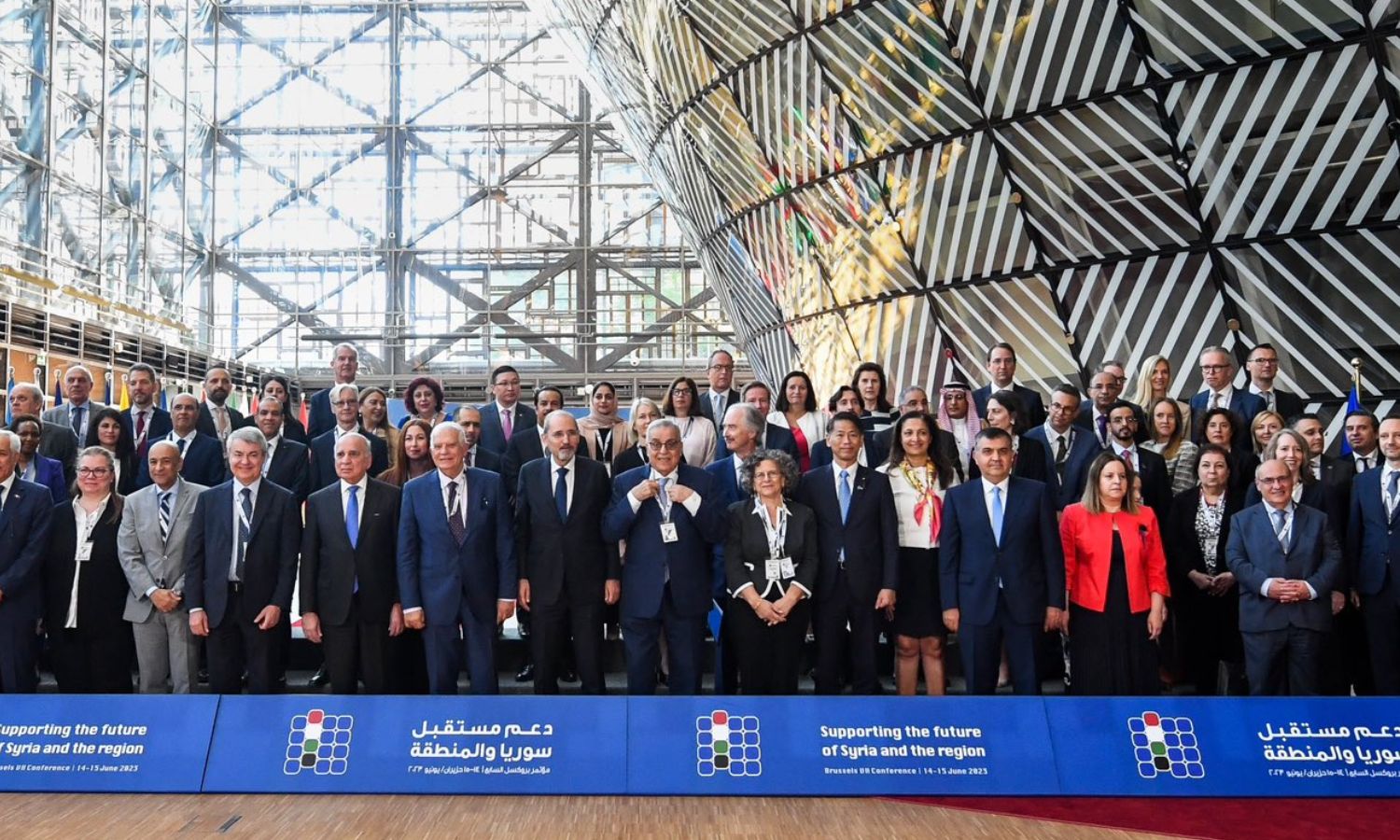
A group photo of representatives of donor countries at the VII Brussels Conference – June 15, 2023 (EU)
Arab attempts, European repulsion
The European Union in VII Brussels commented on the Arabs’ return of the Syrian regime to the Arab League in May and the start of a process of normalization between a number of Arab countries and the regime, as well as the Turkish rapprochement.
Borrell said in his speech at the conference, “Allow me to say, this is not the path that the European Union would have chosen. It’s not. Very soon, we will see if these efforts have convinced the regime in Damascus to engage in a dialogue with Gulf and Arab states over various aspects of UN Security Council resolution 2254.”
Press reports appeared talking about Arab pressures to change the form of the relationship between the European Union and the regime or to ease sanctions against it.
The Emirati newspaper al-Bayan published a report on June 2, quoting informed sources that the Arab group formed at the Cairo meeting in order to follow up on the Syrian file is negotiating with the European Union to ease sanctions and open up to Damascus, according to a step-by-step policy.
In mid-June, Bloomberg also quoted informed sources as saying that Saudi Arabia and the UAE are pressuring allies in Europe to restore diplomatic relations with Damascus and ease sanctions.
According to the report, the Gulf states believe that “ending the war in Syria requires reviving the economy,” while Germany, France, and the United States do not support the Gulf demands.
Dareen Khalifa, senior analyst at the International Crisis Group working on security, conflict, politics, and governance in Syria, told Enab Baladi, “It is very difficult for European countries and the United States to change their policy towards the regime even if they wanted to.”
Khalifa based her opinion on the fact that changing the system of economic sanctions imposed on the regime “is a complex matter and has a high political cost.”
Radwan Ziadeh, director of the Washington-based Syrian Center for Political and Strategic Studies, agrees with this opinion. He told Enab Baladi, “I do not think that the position of the European countries will change after the (Brussels) conference. Rather, their position seemed clear and in harmony with the American position.”
Regarding the issue of Arab pressure on Europe, Ziadeh believes that Europe needs America now more than it needs the Arabs because of the Ukraine war, and therefore it is committed to the American position on the Syrian regime.
Meanwhile, Muhammad Nazir Salem, a researcher at the Syrian Dialogue Center, sees in an interview with Enab Baladi that there has been a “slight change” in European dealings at the humanitarian level and the level of early recovery, based on the European mission’s visit for the first time to the regime’s areas of influence in 2022, and the invitation of the Syrian Red Crescent to participate in the activities of the VII Brussels conference.
Salem considered the invitation of the Syrian Red Crescent as an “implicit recognition” of the possibility of cooperation with humanitarian organizations in the regime’s areas of influence, which means funding these organizations, and the regime benefiting from this funding, as it “practically interferes in a hidden way in the work of these organizations.”
Many media outlets and researchers referred to this interference, most clearly in the UN organizations.
For his part, Ziadeh believes that the call of the Syrian Red Crescent comes from a humanitarian and not a political angle. He does not believe that there are any political connotations on the part of the European Union, with the possibility that the regime will understand the call in a different way but without any benefit.
The Syrian Red Crescent participated in the first day of the VII Brussels conference dedicated to civil society organizations through the Secretary-General of the organization, Khaled Erksoussi, speaking about the need to increase support for the most vulnerable groups in Syria.
In a previous interview, Enab Baladi submitted inquiries to Luis Miguel Bueno, EU Arabic Spokesperson for the Middle East and North Africa, about the influence of Arab countries in easing EU sanctions on the regime to clarify that the Union does not ease or lift sanctions on the Syrian regime, but rather discusses the latest developments with the “partners” in the Arab League.
Bueno stressed that any change in the position of the European Union will occur once the conditions set out in the conclusions of the European Council of 2018 are met and through the usual voting process in the Council.
He said that the EU still believes that any normalization, including through sanctions relief, is conditional on real participation on the part of the Syrian regime in the UN-led political process in accordance with UN Resolution 2254.
Only political messages
The role of the VII Brussels conference is highlighted in terms of relief and the countries’ financial pledges to the Syrians in Syria and neighboring countries, while its political role is limited to speeches, some of which carry political messages clarifying the countries’ position.
The permanent purpose of the annual Brussels conferences has always been to show a beacon of hope for the Syrian people. We are here today to help keep that hope alive. I hope that we will continue to seek a way forward, according to the opening speech of Josep Borrell, the High Representative/Vice-President, at the Ministerial session of the VII. Brussels conference.
Dareen Khalifa of the International Crisis Group believes that the European political discourse “has not and will not change much,” although Syria is not a priority for Western countries, but this does not mean that Europeans are ready to change their attitudes towards the regime.
Researcher Muhammad Salem believes that the absence of a major change in the political discourse “is closer to neutrality, non-attitude, and dissociation, rather than closer to condemnation,” describing it as “an echo or another aspect of the US position,” which practically did not object to normalization, but rather criticized it in a light verbal manner.
There is no great benefit to the conference from a political point of view, given that the main actor in it is the EU, which does not have big cards and does not actively interfere in the Syrian conflict politically.
Often, the “humanitarian streak” prevails over it, and this is natural and in line with the nature of the EU intervention, which is trying to manage the crisis from a humanitarian perspective related to the file of immigration to it in the first place, according to Salem.
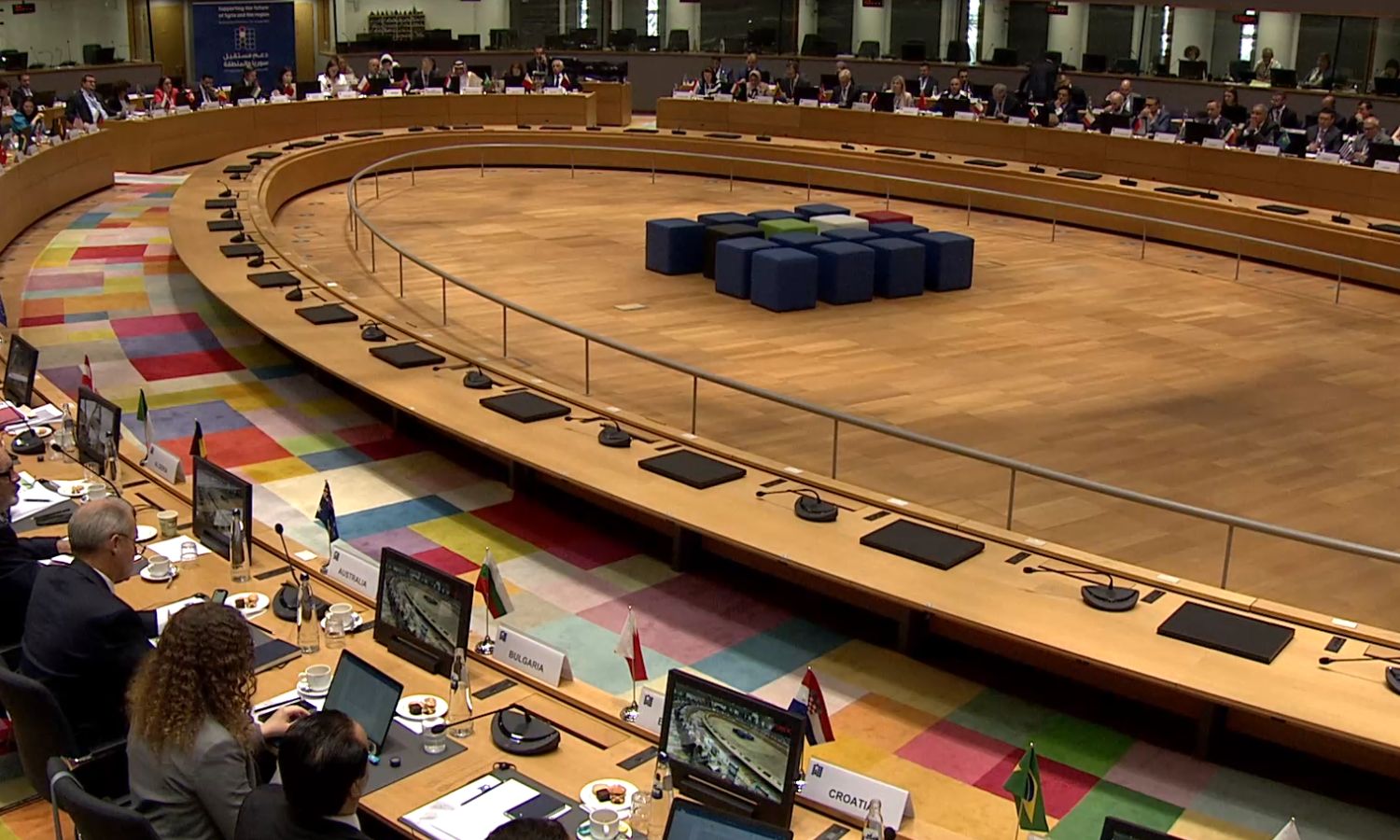
Countries, international institutions, and donors meet at the Brussels Conference – June 15, 2023 (EU – Screenshot).
Increase support, call for refugees “return”
Neighboring countries’ demands in VII Brussels
During the conference on making humanitarian pledges, and despite the difference in their name and the varying intensity of discourse, whether they were presented or delayed, the Syrian refugees were a common denominator for Syria’s neighboring countries.
The diplomatic discourse of Syria’s neighboring countries was unanimous on the issue of returning Syrian refugees to Syria, regardless of reports and indications that confirm that Syria is not safe, affected by the political movement that flew Bashar al-Assad to Jeddah on May 19 to attend the Arab summit, and at the same time demanding greater support to meet their needs in host countries.
“Return is a right”
The most clear of these positions was stated by the Lebanese Foreign Minister,
Abdallah Bou Habib, in a way that does not deviate from the context of what is usually issued by Lebanese officials regarding this file.
Among the three conflicting figures for the number of Syrian refugees (up to 2 million people), the Lebanese minister said Lebanon receives 1.5 million Syrian refugees.
Summing up the deteriorating economic and living conditions in which Lebanon has been mired for years, Bou Habib considered that the Syrian refugees represent a burden on the infrastructure in two aspects, financially and socially, in addition to far-reaching effects on the environment.
Under the slogans that “Return is a right” and that “Lebanon cannot bear the danger of turning into a vast refugee camp,” the Lebanese minister stressed the need for the refugees to return to Syria, also calling for greater assistance by saying, “We were proactive in providing aid, and it is our turn to ask for help in exchange for what we provided before.”
Jordan’s speech delivered by the Minister of Foreign Affairs, Ayman Safadi, topped some numbers and details about Syrian refugees, such as the birth rate and fertility, leading to a focus on the extreme decline in international support for refugees compared to what it was in 2016, a point confirmed by neighboring countries collectively.
At the same time, the Jordanian minister demanded the continuation of support at the appropriate level and the establishment of an international fund to support “voluntary return” by creating a safe environment in Syria.
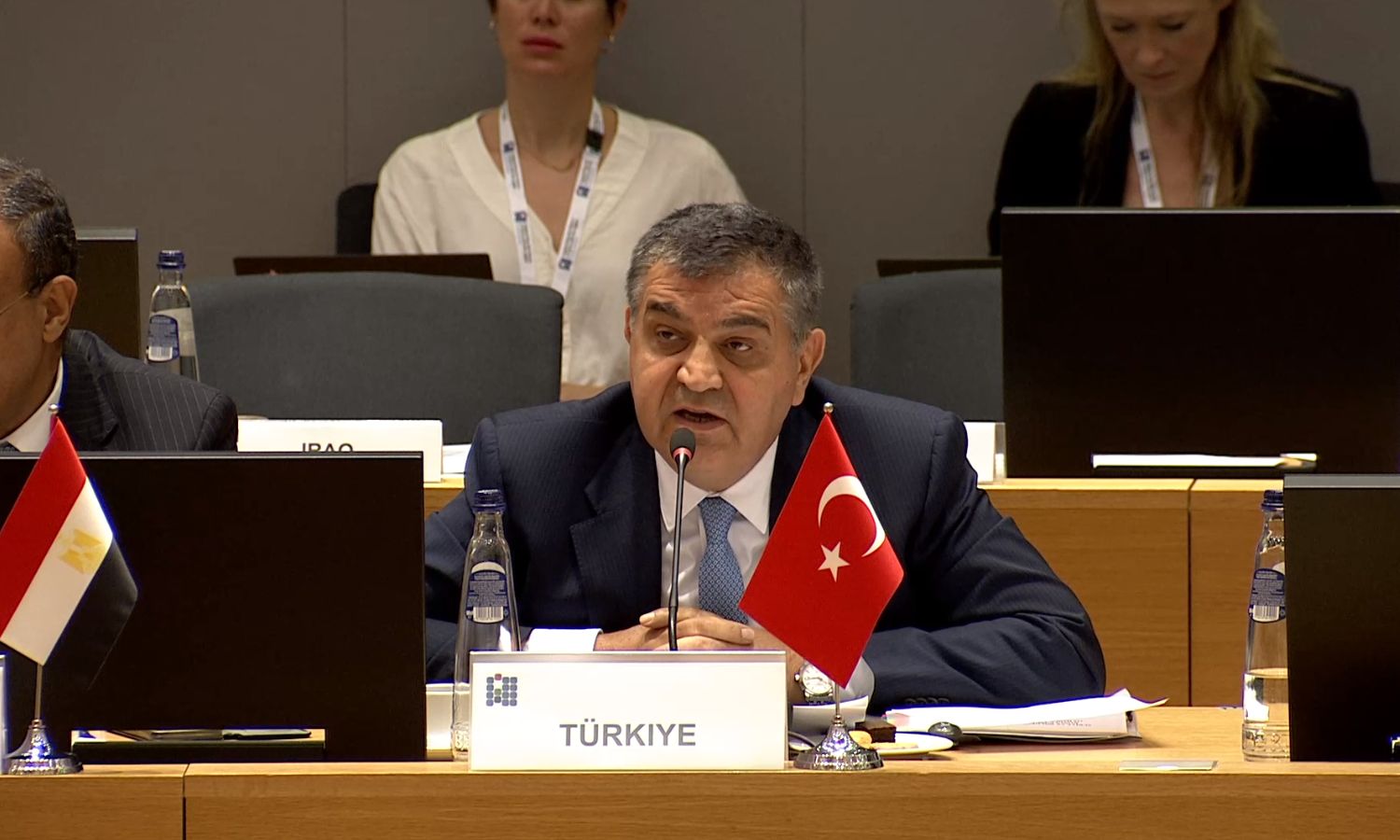
Turkish Ambassador to the EU, Faruk Kaymakci, giving a speech about Syrian refugees and the voluntary return project during his participation in the Brussels Conference – June 15, 2023 (EU – Screenshot)
Al-Hol camp, 1 million Syrians in Egypt
The Iraqi Foreign Minister, Fouad Hussein, did not focus on the issue of “the burdens of the presence of the Syrians,” given that the percentage of Syrians in Iraq is not compared to other countries, such as Turkey and Lebanon.
The Syrian presence is concentrated in the Kurdistan region of Iraq, with about 260,000 Syrians, according to Hussein’s statements. However, he called for international support to solve the issue of the al-Hol camp in al-Hasakah governorate, which includes families of members of the Islamic State group.
The Iraqi minister stressed the need to settle the crisis in Syria through a political solution, calling on those he described as “the parties to the conflict” to sit at a dialogue table and show determination and seriousness to solve the crisis, pointing to the enormity of the humanitarian situation in Syria, particularly after the massive Feb.6 earthquake.
The Egyptian Ambassador to Belgium, Badr Abdel-Aty, who spoke about his country hosting a million Syrians, said that Egypt does not consider them refugees and deals with them equally. He reminded of Egyptian aid to the earthquake-affected people in Syria and stressed the need to adhere to the political solution.
As for Turkey, which receives the largest share among neighboring countries (more than 3.5 million Syrian refugees), the Turkish Ambassador to the European Union, Faruk Kaymakci, called on countries to contribute not only with money but also by increasing their shares of the number of refugees they receive through resettlement, considering the current numbers as few.
Kaymakci also called for aid for refugees in Turkey, explaining that it has received six billion euros since 2016, five billion of which are distributed to the Syrians in Turkey, in addition to allocating an additional three billion since 2021, which he considered insufficient, as Turkey is at the crossroads of the influx of refugees, and needs more direct participation in managing refugee support, simplifying laws and limiting the interference of third parties, according to the Turkish diplomat.
Kaymakci touched on the “voluntary return” project that Turkey is working on to return a million Syrians from its lands to the northwestern regions of Syria after providing shelter and a suitable environment for them, according to Turkish statements.
No intentions to protect
Muhammad Hassan, Executive Director of the Access Center for Human Rights (ACHR), considered the numbers presented about the numbers of refugees and the support provided to them inaccurate. He told Enab Baladi that the demands of neighboring countries hosting refugees do not express clear intentions to provide more protection for refugees.
He also considered that the “incomplete and arbitrary” management of the refugee file granted the host countries a wide range of pressure operations on the international community to obtain funding.
Hassan pointed to the cases of forced deportation that occur from some countries, including Lebanon, of Syrian refugees, in light of international assurances that Syria is not safe.
Regarding whether the “voluntary return” file is a gateway to closing the Syrian file, the director of the Access Center said that the host countries do not care about closing or opening the Syrian file.
“They deal with the Syrian refugees on their lands as a political card, especially the neighboring countries, specifically those who are already suffering from internal problems and crises and naturally feed on aid,” he added.
Civil society
Urgent issues only present in protocol form
Within three discussion sessions, representatives of civil society organizations from inside Syria in different areas of control, organizations concerned with refugee affairs in neighboring countries, as well as EU experts and representatives of UN relief and humanitarian agencies, gathered on the first day of the VII Brussels conference.
The three sessions were titled “Addressing needs, access to basic services and early recovery in the Syrian context and the second panel discussion: Developing opportunities at the local level: empowering and protecting local leadership.
In addition to “Promoting justice and accountability for the Syrian people – State of ongoing efforts by civil society, International organizations and national judicial authorities and ways forward.”
The first day of the conference was attended by a large number of Syrian civil society organizations spread throughout the Syrian geography and neighboring countries, amid criticism of the themes of some of the sessions by the attendees, such as choosing “Early Recovery Projects” as the title of a session that included a discussion of basic needs in Syria.
The European Union spokesperson, Bueno, told Enab Baladi that the criteria for determining the presence of organizations at the Brussels conference are mainly related to their active participation in the consultations prior to the conference, adding that these consultations were also used as a basis for selecting relevant topics for discussion at the conference.
Potential speakers for the conference were also suggested through the consultation processes of the EU delegations, together with various stakeholders.
The EU Arabic Spokesperson for the Middle East considered that a balance was ensured in the participation of Syrian civil society organizations through several criteria in terms of regional representation, gender and age diversity, thematic areas of interest, a clear history of activity, and commitment to the principles of inclusion, good governance, and human rights, to ensure broad and representative participation from the various Syrian geography.
The EU and the UN missions also held consultations with organizations in neighboring countries, and the missions relied on a virtual platform to communicate with civil society, which now includes more than 700 activists and organizations, which provides an adequate perspective on the issues under discussion, according to Bueno.
Attendance obstacles
Mohammad al-Abdallah, Director of Syria Justice and Accountability Center (SJAC), who was the director of the human rights session at the Dialogue Day, told Enab Baladi that many representatives of Syrian civil society organizations, especially in the northwestern and northeastern regions of Syria, were unable to attend the conference due to obstacles related to identification papers, entry visas, and others, which makes attendance “not diverse,” according to numerous complaints heard by VII Brussels participants in side conversations.
For her part, Roula Baghdadi, executive Director at Dawlaty organization, who was present at the “Empowering Local Leadership” session in her capacity as the ministerial rapporteur who will attend the foreign ministers’ session on the next day of the conference, said that the first day witnessed a “significant” absence of a significant number of working organizations on the ground, whether inside Syria or in neighboring countries for reasons related to entry visas.
In addition, the EU did not bear the costs of accommodation or flight, which may amount to about $1000, an amount that organizations operating in Syria, Lebanon, and Turkey may not be able to afford, depending on their budget and priorities.
Baghdadi told Enab Baladi that the recurring problem in international conferences on Syria is the absence of the role of youth, as most of the attendees in Brussels were over 35 years old, pointing out the need for them to attend because they may hold different perceptions on various issues, giving new faces access to decision-making centers.
While the Executive Director of the Local Administrative Councils Unit (LACU), Bahjat Hajjar, who is one of the speakers of the discussion session related to “Empowering Local Leadership,” considered that this version of the conference is the most diverse in terms of the presence of organizations, through the presence of international and regional organizations from neighboring countries, and local organizations distributed in unequal proportions among the three areas of control, with a clear majority of organizations operating in northwestern and northeastern Syria.
Priorities Split
The civil society organizations present on the first day of the conference discussed various topics with specific titles, some of which were not accepted by a number of attendees.
Bueno, EU spokesperson, said that the topics and titles of the sessions were determined based on a series of consultations between the European Union, civil society organizations, and other partners, and these consultations aimed at identifying the most pressing issues to be addressed during the “Day of Dialogue” event, which reflects current priorities and areas of focus within the civil society sector.
While the human rights activist, Mohammad al-Abdallah, said he absolutely disagrees with some of the titles that were discussed during the “Day of Dialogue.” For example, proposing to discuss early recovery gives the impression that the battles in Syria have ended and that the situation has stabilized. It neglects the idea that most of the country’s population, in all areas of control, depends on humanitarian aid amid the absence of any immediate breakthrough on the issue of sanctions or international investment and other pressing issues, he assured.
In the “Strengthening Local Partnerships” session, al-Abdallah considered that what was mentioned during it was “good,” such as the cohesion and brotherhood between Syrians in different areas of control in the earthquake disaster, but it is a talk that skips over reality and ignores it, as this state of solidarity was temporary and brief, in light of the existence of fighting between the regions of government and the refusal to help sometimes for political reasons.
While Hajjar considered that to determine whether the issues discussed are important or not, this must be determined according to multiple points of view, as they may be urgent issues raised from the point of view of the local population or neighboring countries, indicating that the issue of early recovery is a very problematic and sensitive issue, but it has become a “fait accompli” as one of the issues on the table, and it is a priority for the Syrians, according to his opinion.
Lawyer Roula Baghdadi, director of the Dawlaty organization, indicated that there is a division in the issue of early recovery between one section that sees an urgent need and calls for discussion and another that believes that it is early to talk about the issue, and each of them has logical arguments and reasons, but there may be confusion about what the donor means with the issue of early recovery on the one hand, and between the two Syrian sections not agreeing on the priority of the issue.
Regarding the last session, which included a human rights discussion on the Syrian file, al-Abdallah said that the discussion reflected the difference in viewpoints and understanding of the reality between the parties in Syria, indicating that despite the limited impact of the conversation, it is important to discuss these issues in the VII Brussels conference.
Hajjar believes that the human rights file and accountability is important to discuss so that human rights files are present in this type of international conference to emphasize the necessity of accountability and to ensure that financial support is not delivered to perpetrators and violators of human rights.
Baghdadi agrees with Hajjar that the issue of detainees and the previous and continuing violations of human rights everywhere in Syria must be raised by any event related to Syria and must be discussed in isolation from anything else.
“Protocol” day
The issues that are discussed annually and the size and type of attendance raise questions about the feasibility of the discussions that precede the states’ declaration of the value of the pledges they will make in the Syrian file and their impact on the value of the various pledges and issues that the Syrians suffer from and what is hoped for in this context.
Bueno, EU Arabic Spokesperson for the Middle East and North Africa, said that the structure and design of the Brussels conference, which includes a “Day of Dialogue” and is followed on the second day by the ministerial meeting, is by its nature intended to allow the recommendations resulting from the first day to enrich the discussions and decisions on the second day.
He pointed out that the EU’s consultations with civil society, which take place before, during, and after the conference, aim to ensure continued dialogue and engagement on the most urgent issues facing Syrian civil society.
Bueno considered that the importance of these issues extends beyond the conference, and their impact and importance must be communicated to the international community to enhance understanding, support, and action. Therefore, while it is difficult to determine the exact impact of the first day’s discussions on the pledges made on the second day, the conference structure and ongoing consultation processes are clearly designed to facilitate this effect.
The first day’s discussions have nothing to do with the value of the pledges that will result from the conference, which are prepared by donor countries based on many considerations, including their available budgets and resources. The human rights activist, al-Abdallah, considered that the conference is for granting funds and not a conference for resolving the Syrian crisis or for negotiations, adding that the first day’s discussions bear no impact on reality and part of it is “protocols” and nothing more.
The director of the Local Administration Councils Unit, Bahjat Hajjar, said that the most prominent thing that came on the second day, in addition to the pledges, was the political positions of the countries, especially on the issue of normalization with the regime, which was the most prominent issue around which the speeches of the representatives of the donor countries centered.
In turn, lawyer Baghdadi believes that the civil society debate can be felt on the second day by determining the method of disbursing the funds pledged by the states without having a direct impact on the value of those pledges.
if you think the article contain wrong information or you have additional details Send Correction
النسخة العربية من المقال
-
Follow us :













 Syrian children on a hill above a refugee camp in the town of Bar Elias in Lebanon’s Bekaa Valley, June 13, 2023 (AP)
Syrian children on a hill above a refugee camp in the town of Bar Elias in Lebanon’s Bekaa Valley, June 13, 2023 (AP)





 A
A
A
A
A
A
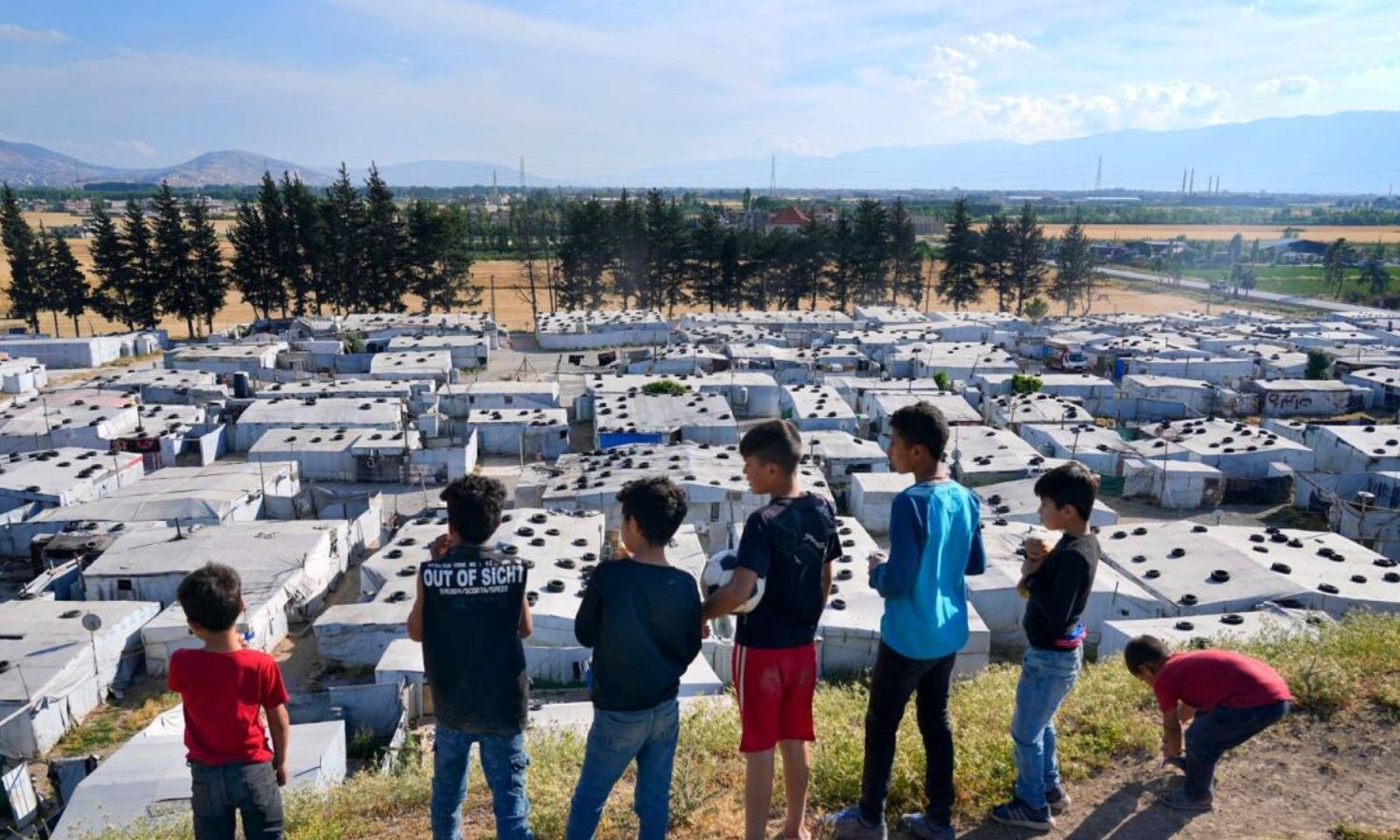
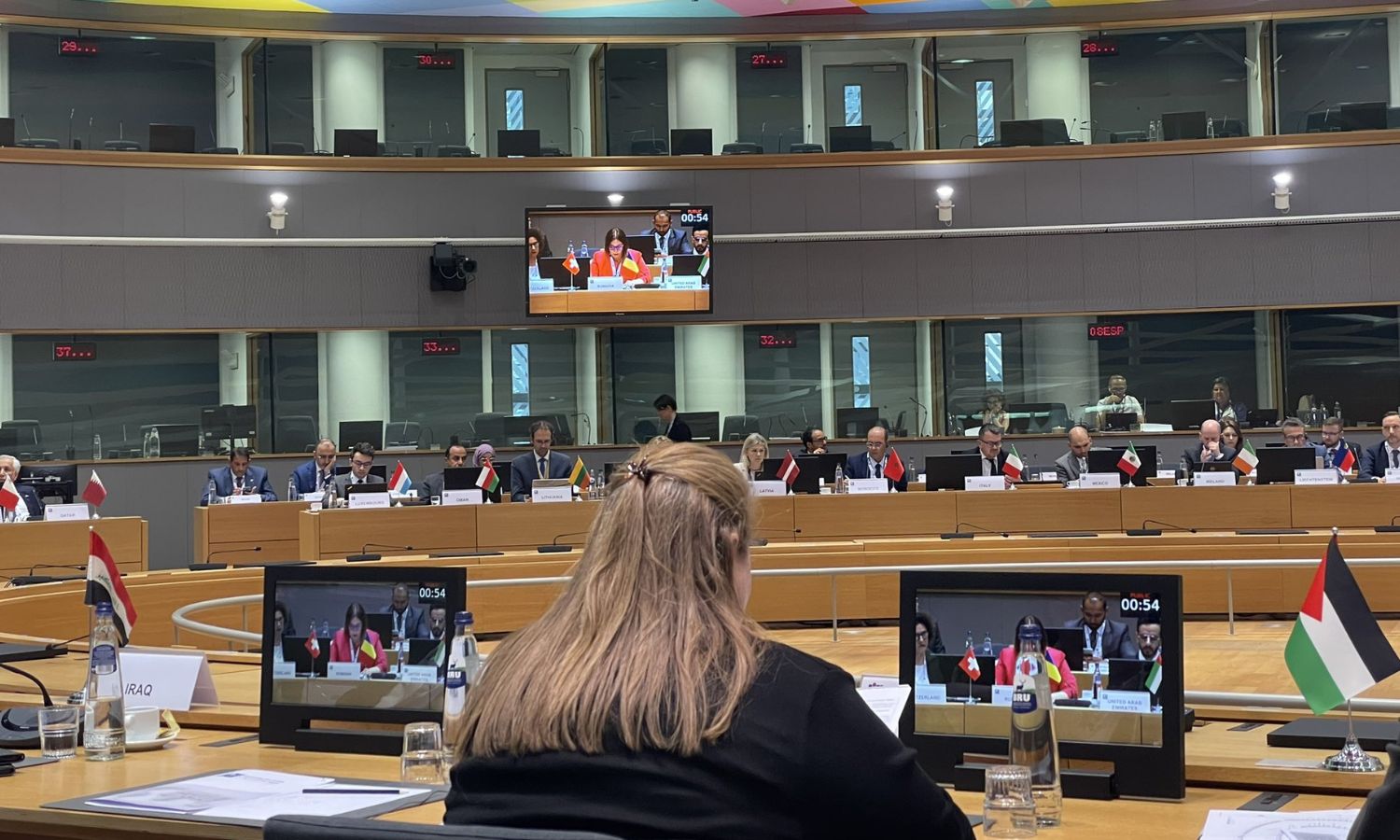
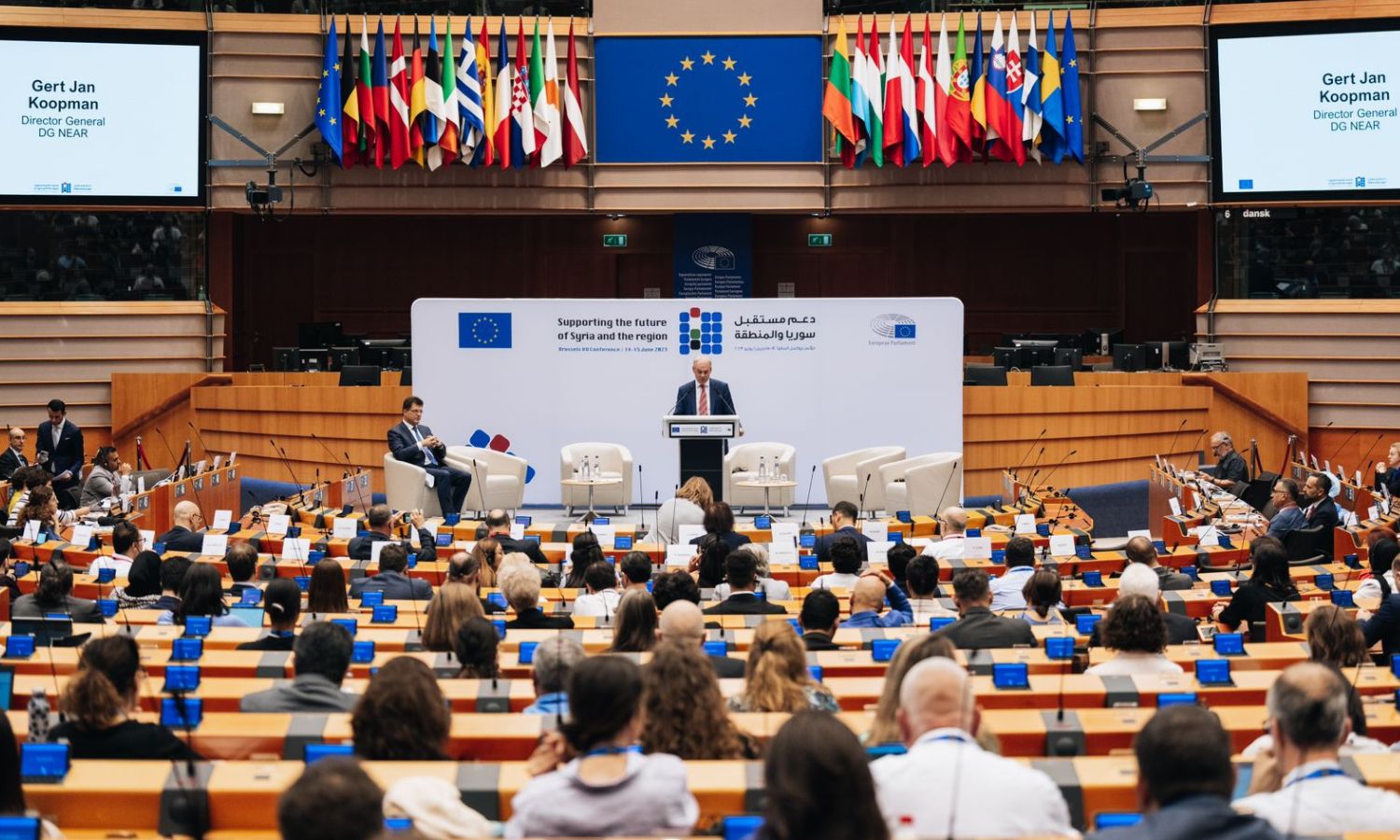







 More In-Depth
More In-Depth